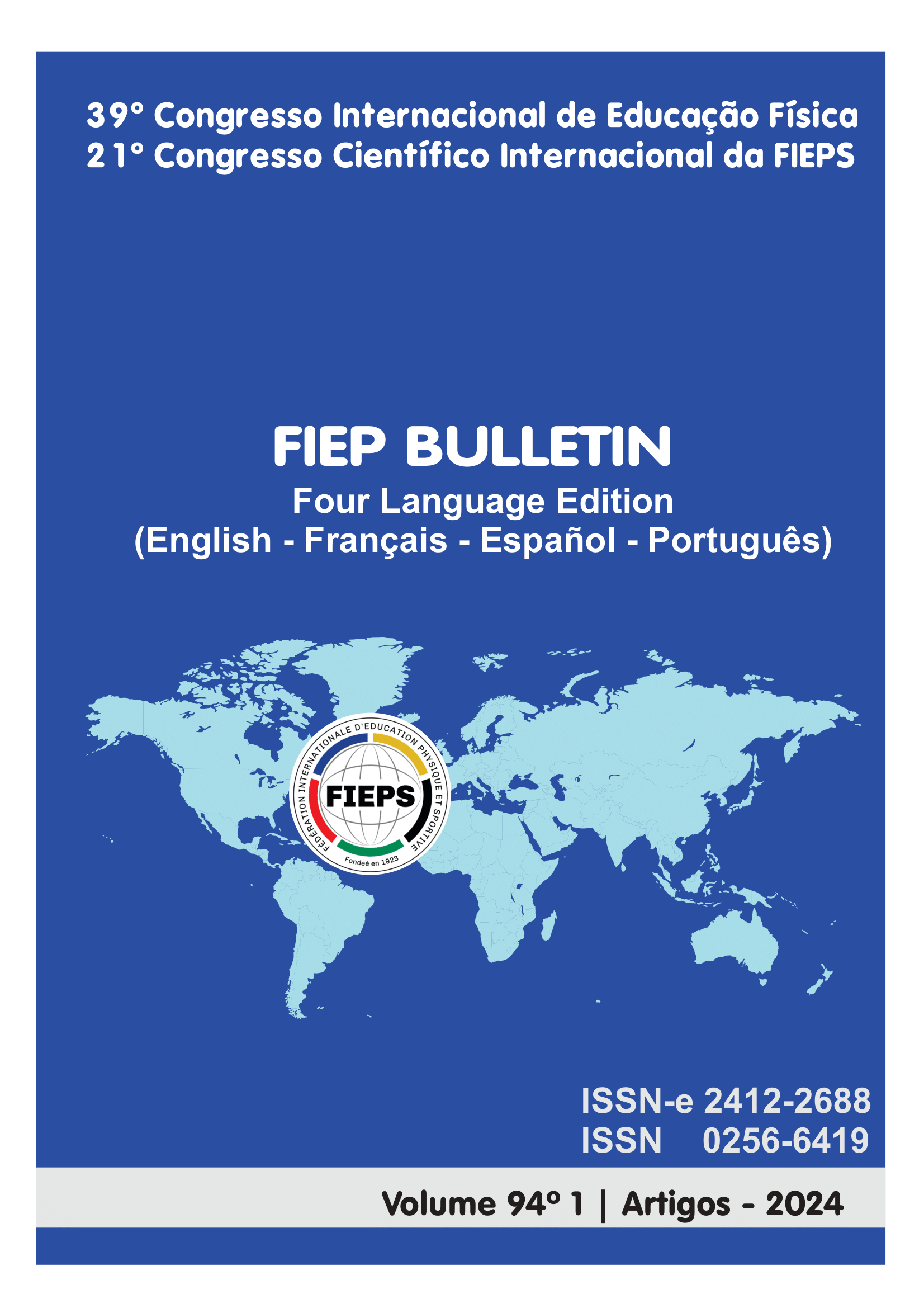MAKING HISTORY: A LOOK AT THE ACHIEVEMENTS OF THE WOMEN'S FUTSAL TEAM AT ESCOLA SÔNIA HENRIQUES BARRETO, IN THE MUNICIPALITY OF LARANJAL DO JARI- AP, IN SCHOOL SPORTS
DOI:
https://doi.org/10.16887/fiepbulletin.v94i1.6711Keywords:
Keywords: futsal, female empowerment, school games, physical education, social vulnerability.Abstract
Introduction: The current context of Education advocates that the student is the protagonist in the school environment. In this sense, the actions of pedagogical work must ensure the participation of all those involved in the collective work. Objective: reflect on the accomplishments and achievements of the students who are part of the futsal team at the Sônia Henriques Barreto State School, located in the municipality of Laranjal do Jari/Amapá, on the importance of sport at school, addressing the successful experiences of the students in the School Games. Methods: qualitative research, through a case study, with 12 high school students and four physical education teachers, who are part of the state education network in Amapá. For data collection, semi-structured questionnaires and interviews with students and teachers were used. Other sources used were the training observation technique, meetings with parents, friendlies, during the period when the students were participating in the School Games. Results: The titles won are the result of hard work involving students, parents, employees, educators and managers who value sport as an education tool through experiences. The school fulfills its social role in awakening in these students their responsibilities and interests, making them protagonists of their own choices. Conclusion: Works like this instigate debates on the practice of physical education in schools located in stilt houses, focusing on female empowerment, challenges faced by public schools in Amapá, achievements and experiences of students participating in School Games at municipal, state and national levels.
Downloads
References
ABI-EÇAB, A. A função social do esporte na construção identitária dos sujeitos. Serviço Social em Revista, v. 19, n. 2, p. 45-62, 2017. DOI: https://doi.org/10.5433/1679-4842.2017v19n2p45
BRASIL. Parâmetros curriculares nacionais: terceiro e quarto ciclos: educação física / Secretaria de Ensino Fundamental. Brasília, MEC/SEF, 1998.
BRASIL. Ministério da Educação. Base Nacional Comum Curricular: Educação é a Base. Brasília, MEC/CONSED/ UNDIME, 2017.
CRUZ, M. M. S.; PALMEIRA, F. C. C. Construção de identidade de gênero na Educação Física Escolar. Motriz. Journal of Physical Education. UNESP, 116-131, 2009.
MINAYO, M. C. de S. Pesquisa social: teoria, método e criatividade. Editora Vozes Limitada, 2016.
LOPES, Celina; DE OLIVEIRA, Rafael Fernando Pereira; DE ALENCAR, Gildiney Penaves. Como a Prática Esportiva Inclusiva na Escola Pode Contribuir na Vida Social do Aluno?. Revista de Ensino, Educação e Ciências Humanas, v. 22, n. 1, p. 102-108, 2021.formação. Curitiba: Ibpex, 2011. DOI: https://doi.org/10.17921/2447-8733.2021v22n1p102-108
PEREIRA, E. C. R.; FONSECA, Z. V. D. Futsal feminino x preconceito: como anda o placar dessa partida?. Disponível em: <https://docplayer.com.br/15599037Futsal-feminino-x-preconceito-como-anda-o-placar-dessa-partida.html>. Acesso em: 25 ago 2022.
PANICO, R. PEREZ, T. (ORGS). Direção para os novos espaços e tempos da escola. Editora: Santillana Educacao, 2022.
VEIGAS, J. et al. Motivação para prática e não prática no desporto escolar. O portal dos psicólogos, 2009.
Downloads
Published
Issue
Section
License
Autores que publicam nesta revista concordam com os seguintes termos:- Autores mantém os direitos autorais e concedem à revista o direito de primeira publicação, com o trabalho simultaneamente licenciado sob a Licença Creative Commons Attribution que permite o compartilhamento do trabalho com reconhecimento da autoria e publicação inicial nesta revista.
- Autores têm autorização para assumir contratos adicionais separadamente, para distribuição não-exclusiva da versão do trabalho publicada nesta revista (ex.: publicar em repositório institucional ou como capítulo de livro), com reconhecimento de autoria e publicação inicial nesta revista.
- Autores têm permissão e são estimulados a publicar e distribuir seu trabalho online (ex.: em repositórios institucionais ou na sua página pessoal) a qualquer ponto antes ou durante o processo editorial, já que isso pode gerar alterações produtivas, bem como aumentar o impacto e a citação do trabalho publicado (Veja O Efeito do Acesso Livre).










